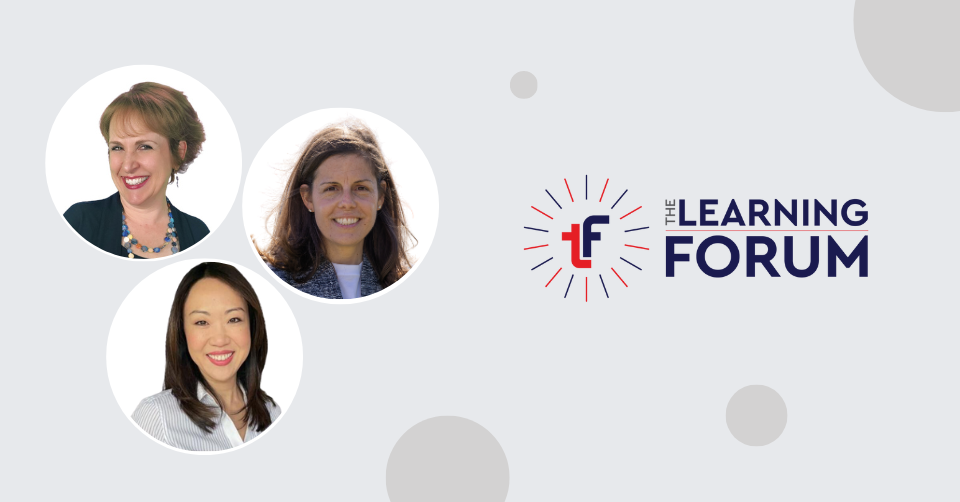
Expert panel: Moving to a skills-based talent strategy
The move from a role-based to a skills-based talent strategy is well underway for many organizations. This panel discussion with skills strategy experts reveals common themes in how companies think about skills and use data to accelerate their journey.
Organizations are adopting skills as a “unit of currency” across HR – including learning, talent acquisition, succession planning, and career development. They’re doing this for a few key reasons:
- Retention and satisfaction of employees – employees have said career transformation is vital to them, and a skill-based approach provides a more direct, personalized approach to this.
- Talent agility - the ability to assign talent where it’s needed quickly.
- Creation of a common language - this centers around skills, and often goes hand in hand with uniting the HR org around skills data.
Moving to a skills-based talent strategy requires a skills framework, as well as effective, efficient ways to develop and verify skills. Skills intelligence is at the heart of the strategy, and measurement is key. For our panelists, power skills are the most critical skills within their workplace and are the skills most focused on right now. The speakers agree that employees must demonstrate that they can apply a skill in the moment, in specific workplace scenarios. These leading companies are using simulation learning to achieve this.
Q: Why are you so focused on skills now?
Linda: I have had the privilege to lead both L&D as well as talent management and also career planning. So for me, it's probably quite natural to look across all these puzzle pieces and to make sure that we can experiment and find more energies as we go along. So, one of the first things we did was implement skills into executive talent review and succession planning.
We made sure that we sat down with the executive team and asked them to assess their direct reports on the skill proficiency level. We use that as the benchmark for ongoing executive development and coaching. When it comes to the broader 20,000 employee population, we made sure the narrative for why skills is very clear. We understand from our employee voice listening and engagement surveys that career transformation is very important to our employee base. So all the things we roll out around why power skills, why soft skills, why do you learn these, why do you need to spend time on this is all connected to this will help you become a better manager. This will help you make a cross-functional move. This will help you be more proficient, collaborative, and innovative in your current role. So we used all sorts of panels, discussions, and leader talks to emphasize those messages to make sure people understand the first thing we want to emphasize skills and performance management is not to impact their pay, but to help them and what the benefit is for them. So that helped with building up momentum. We see people very energized and motivated to learn in their own time, having conversations with their managers about what skills they want to grow and what skill gaps they want to close. So those are my learnings in terms of if you want to start a skills initiative, make sure the why is clear and also the future state where you want to get to.
Katie: I'd build on that, in knowing that future state is like how do you start knowing where to go, that's through what is it you're capturing and measuring. So, that opening question of what skills does our team have? And that can usually come from some type of diagnostic and from our experience, oftentimes grounded in a single program. Level setting where you are today, and stitch together the L&D goals with the talent management so that you can paint that picture like what Linda was saying so each employee can feel it's a tangible goal to reach. They can see their own path to achieving that individually, even though you're doing this at scale. And that's one of the elements we also encounter in ETU is how to deliver this at great scale, even though you want it to feel personalized in some ways.
Q: What are those skills and how do you narrow them down to what's important?
Linda: We worked with Korn Ferry to use proficiency level and pretty much the same skill, but on a behavioral level, how would that look differently for senior directors and the directors and then for managers. Then the majority of the work is really to figure out the most personalized and meaningful development experience for different population.
And I have to say the pilots and later scaled up implementation with ETU was a great experience for most of our business units who have gone through the manager training, particularly around skills like leading with inclusion, having difficult performance coaching conversations, those things that only come with practice and the feedback. And I think most of the participants love the personalized learning, the part where they know they did well versus where they still need to do better. And that helped them to pinpoint exactly where they are at in terms of that learning map. So we could do the learning and roll out the learning solutions quite quickly at a scale.
Katie: As for the data that is generated by having an employee or a learner be put into that scenario, they get the opportunity to practice, but they have to demonstrate that they can deliver upon that skill. That way, employees can then be upskilled or re-skilled within the business, maybe in different ways than they had initially joined the company. And I think when you are trying to winnow down this list of what are the power skills, we worked with Brandon Hall on an ebook on how do you get skills intelligence in the talent space.
Q: Can you use AI and other technology to track or develop these skills?
Linda: My team is all in running towards AI instead of running away from AI. So, since last November, we have noticed on the LinkedIn platform that the number of jobs that mentioned AI skills has gone up 21 times, and at the same time, there are a lot of people adding AI-related skills to their profiles. So, starting in April, I told my team we needed to just experiment with how we could adopt AI in our own L&D production as well as how we help build an AI-ready mindset and skills across the organization.
Panelists
The above extracts are taken from a webinar hosted by Brian Hackett of the Learning Forum with an expert panel that included:
- Linda Jingfang Cai, Former VP of Talent Development, LinkedIn
- Theresa Zeller, Global Head of Integrated Learning, Merck
- Katie Laidlaw, CEO, ETU

